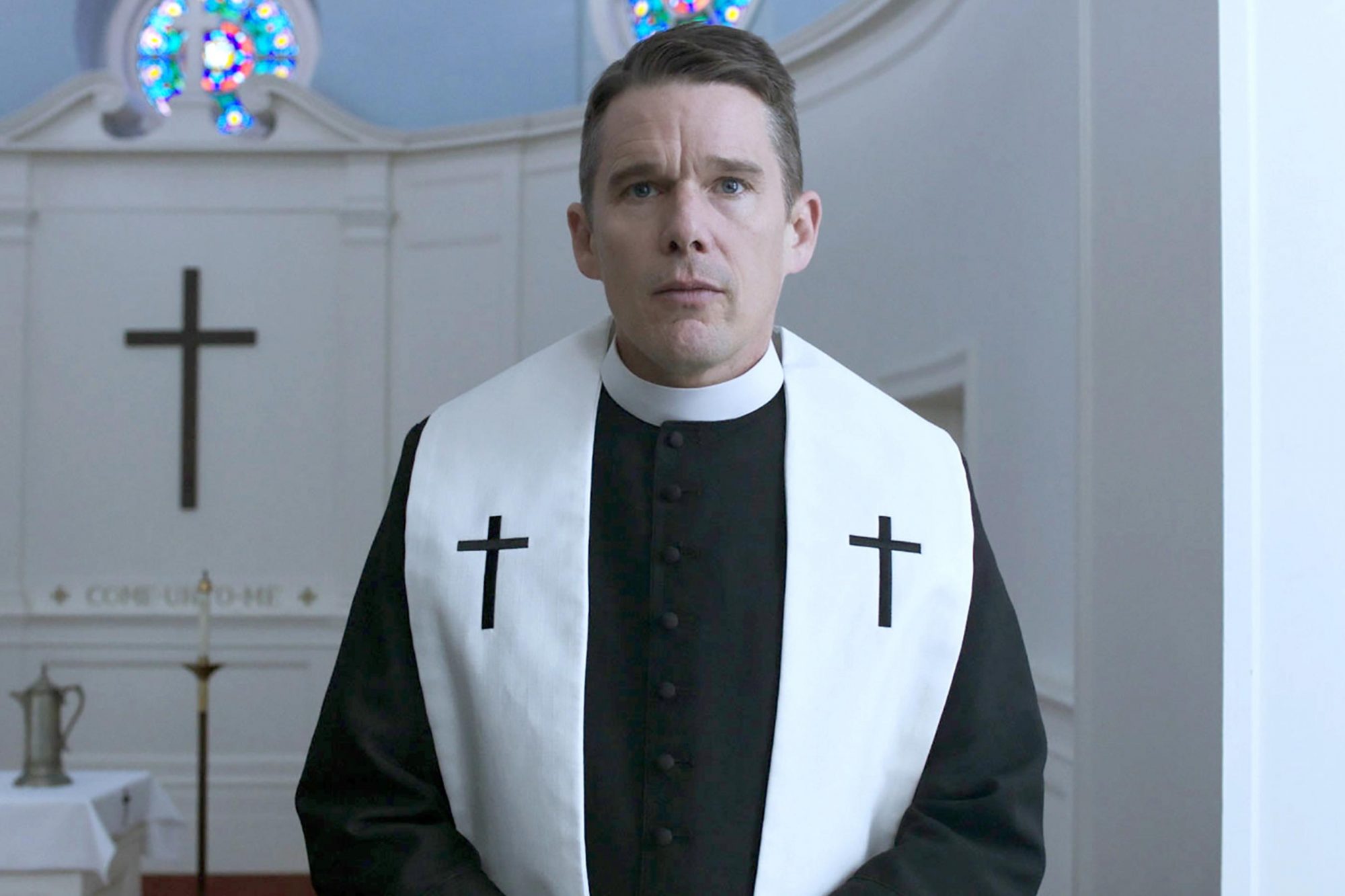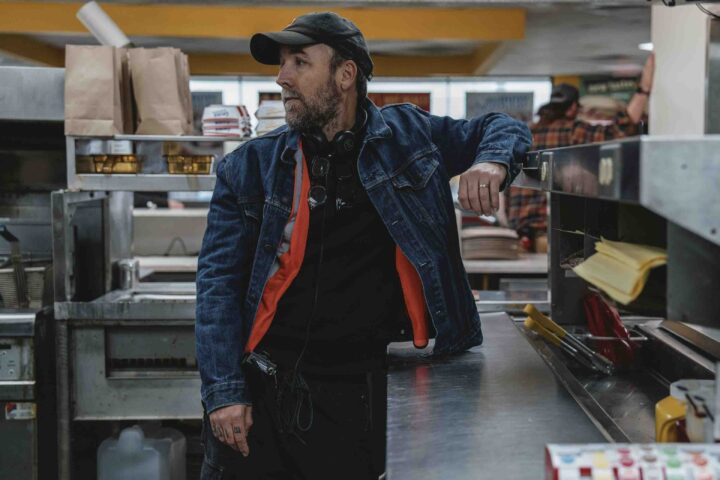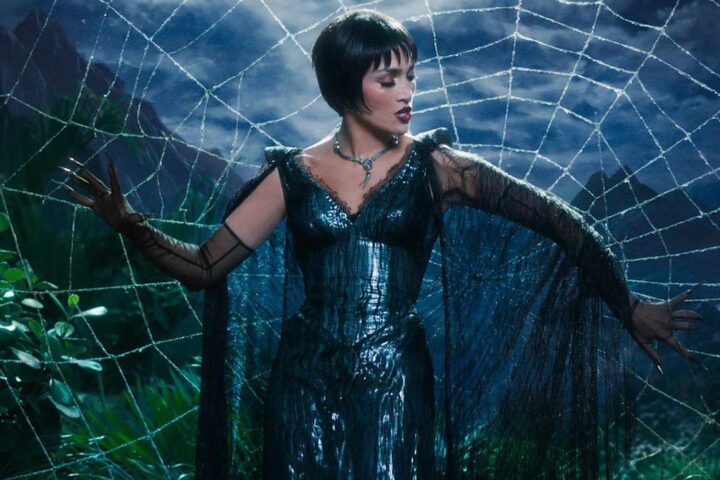Paul Schrader’s First Reformed, about a reverend’s crisis of faith, is the most narratively and thematically ambitious American film this year. A meditation on spiritual ennui and glimpse into the mind of a bleak character peering into the abyss without comfort, Schrader’s film is a vice-grip ambuscade—it cannily attaches us to its protagonist and then closes its walls around him, and us.
Ethan Hawke, in a career performance, is an upstate New York preacher named Reverend Toller, a man of the cloth who, in classic Schrader fashion, lives largely in solitude and becomes progressively haunted by what he sees around him—in this case disturbed parishioners, failures of the church to fulfill its spiritual mission, capitalist corruption and a rising sense of dread about our willful destruction of God’s planet. Heavy stuff, and both Schrader and Hawke are more than up to it.
When we first meet Reverend Toller he’s a fixture at the First Reformed Church in update Snowbridge, New York, a sparsely attended sanctuary less noted for its current orator and more for its abolitionist history, a centuries old relic more exciting to touring school kids learning about the Underground Railroad than to local residents, who have since flocked to the megachurch up the way, run by a pragmatic Pastor Jeffers (Cedric Kyles). Toller and Jeffers are longtime friends, and together planning a re-consecration of the First Reformed to commemorate its historic significance, the time is ripe for Toller to fall from proverbial grace.
This begins when he’s called upon to counsel a troubled parishioner and environmental radical (Philip Ettinger), and an early ideological debate about whether hope is merited for the kamikaze course of today’s world is pungent and probing. The man’s worried, pregnant wife, Mary (Amanda Seyfried, digging in), believes the pastor’s counsel will do the trick calm her both her husband’s mind and his insistence on an abortion. But the fateful meeting, a protean, extended Schrader debate that is disarmingly potent, sets in motion two events—the counseled man’s rapid suicide followed by a veritable dark night of the soul for the good Reverend Toller.
Toller, a divorced, former military chaplain whose wife fled after their son’s untimely death in Iraq, whiles the hours alone in church residence quarters, journaling and hard drinking, and his internal monologue—increasingly despairing—lies in contrast to his public visage, a classic Schrader device deployed in his screenplay for Taxi Driver, where Travis Bickle’s disturbed observances of New York sleaze found the means to course correct, a struggle echoed in this picture. And like Bickle’s obsessions with a beautiful political candidate’s assistant and a young prostitute, Toller finds, in Mary, a similar object of affection he hopes to possibly redeem. Like Bickle, Toller begins to obsess on dual missions—personal and macro—that assuage his void, his purpose renewed.
And then there’s Mary discovery of her late husband’s crudely constructed suicide vest. It might be remiss to say more about the events that drive Toller’s evolution from belief to disillusionment, but suffice to say that Schrader resolutely depicts physical and spiritual decay like no one’s businesses, and as Toller’s world view dims his health also fails, urinating blood and perhaps even in the grip of cancer.
He also turns to the drink, arising concern in Pastor Jeffers, and cruelly rebuffs the concerned advances of a past romantic interest, Esther (Victoria Hill), a choir director in Jeffers’ megachurch, which itself has been largely underwritten by an industrialist Energy CEO (Michael Gaston) dumping “EPA approved” waste in a sludge of a local river Why, Toller muses, does no one care, including Pastor Jeffers? And why are those who do deemed wingnuts?
Toller’s central frustrations (and Schrader’s assertions) are those of environmental erosions and apathy, chiefly the responsibility we have to honor God’s creation and how in the final judgement we will answer for its willful destruction. First Reformed is also probing about the relationship between organized religion and big business, a mutual backscratching that betrays the church’s mission. Once Toller goes down this enlightened path, there is simply no way he can counsel parishioners to keep the faith about the future of a world he knows is on the brink of ruin.
Hawke, who with Leonardi DiCaprio stands as the best of his generation, gives a resourceful, career performance of deep, dark recesses, and by the time First Reformed unspools to its potentially outrageous—and every bit earned—denouement, he conveys the pain of a wounded, cornered animal cut loose from both belief in the church’s power to heal and perhaps even in a God who never seems to answer the call. As an actor, to look at a hopeless world through such committed eyes must have been an extraordinary reach. For us to see it through his is a trick of empathy that Schrader carefully calibrates for most of the movie before pulling out the rug in his final scenes, as humanizing a portrait of a radical extremist as perhaps ever committed to film.
4 stars.



